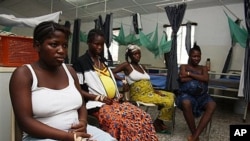In Sierra Leone, one in 20 women die either during pregnancy or when they give birth.
UNICEF says Sierra Leone women die at the rate of 1,360 per 100,000 live births, the highest in the world.
The UN agency says such deaths represent 36 percent of all fatalities among Sierra Leone women aged 15-49,
Most (46%) die from hemorrhage, according to UNICEF, followed by hypertension (22%), obstructed labor (21%). and sepsis (11%).
Countering hemorrhage is primarily done via blood transfusions. But the World Health Organization notes that before the COVID pandemic, Africa overall only collected about half of the blood needed by medical facilities. When COVID came, WHO says donations dropped another 17 percent.
The Washington Post notes a number of mortality factors besides a lack of blood donations. The newspaper cites a persistent shortage of health workers, and notes that because abortion is illegal, such procedures contribute between three to four percent of the total maternal fatalities.
Sierra Leone, in 2010, dropped fees for doctor visits and drug prescriptions under its Free Health Care Initiative (FCHI), which has been supported by Britain and other nations. By providing free access, the west African country's percentage of births at a hospital or other health facility went from 25 percent in 2008 to 83 percent in 2019. Today, UNICEF says 90 percent of deliveries are done by trained health providers.
But much of that outside support ended because of the pandemic and nations needing to give that top priority. Britain has said it must stop its FCHI funding this September.
Meanwhile, babies keep coming from the wombs of Sierra Leone's women. And the struggle to make pregnancy and childbirth safer continues.






